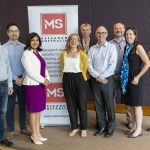- Associate Professor Kaylene Young and Professor Bruce Taylor are working towards new discoveries that may provide treatments to protect and repair the nervous system in MS as part of the novel and innovative MS Research Australia Macquarie Group Foundation Paired Fellowship.
- Progress is being made on cellular research with a genetic change linked to families with MS.
- Design and planning for a new clinical trial aiming to repair myelin damage in people with MS is underway.
The MS Research Australia Macquarie Group Foundation Paired Fellowship is a novel scheme where a senior laboratory-based research fellow and a clinician work together to ‘fast-track’ research breakthroughs and improve outcomes for people living with MS. The inaugural Paired Fellowship was awarded in 2017 to Associate Professor Kaylene Young and Professor Bruce Taylor from the Menzies Institute for Medical Research in Tasmania. They have made some exciting progress so far.
MS Translation Centre and the MS Research and Translation Network
Associate Professor Young and Professor Taylor have established the MS Translation Centre at the Menzies Institute for Medical Research and the MS Research and Translation Network. One of the projects they have been working on, along with members of the Network, is the production of a Massive Open Online Course (MOOC) called Understanding MS.
The course launched internationally in April with almost 4,000 people enrolling and close to 2,000 people completing it. The launch was a success with 97% of participants recommending the course and 61% stating they would implement what they’ve learnt into their lives. Of those that completed the course, 40% had MS, 40% were carers or family members of people with MS, and 20% had no link to MS. This is a great initiative to educate people about MS while also raising awareness of the disease.
Genetic changes in families with MS
In his clinical research, Professor Taylor has identified families with an unusually high number of people with MS. His research has identified a genetic change that occurs only in the family members who have MS. In collaboration with Associate Professor Young, they are now working to determine the role this genetic change plays in cell health using cells derived directly from the people with MS.
Associate Professor Young has used a cutting-edge technique with international collaborators to generate stem cells and then myelin-producing cells directly from blood cells of the family members affected by MS. These cells will form part of a wider stem cell repository called MS Stem. Currently, they have blood samples from 70 people with the aim of having stem cells generated from all samples by early 2020. The ultimate goal of this study is to determine how the genetics of these cells are causing biological differences and to see if any existing drugs can be found to treat those differences.
Clinical trial into myelin repair
In her laboratory research, Associate Professor Young has found that a form of non-invasive transcranial magnetic stimulation can promote myelin growth in laboratory models of MS. To complete this work, Associate Professor Young and her team have developed new models of MS that more accurately mimic what is happening in human disease, to fully investigate the way that transcranial magnetic stimulation leads to myelin repair. They are now launching a clinical trial to determine if this treatment is safe and effective for people with MS. Participants have been recruited for the trial, and 30 are expected to complete the trial by early 2020.
The progress that has been made on these studies is huge and exciting, and we look forward to the outcomes. This work will provide a greater understanding of the genetics of MS, and importantly, will hopefully lead to the treatment of people with progressive forms of MS.






